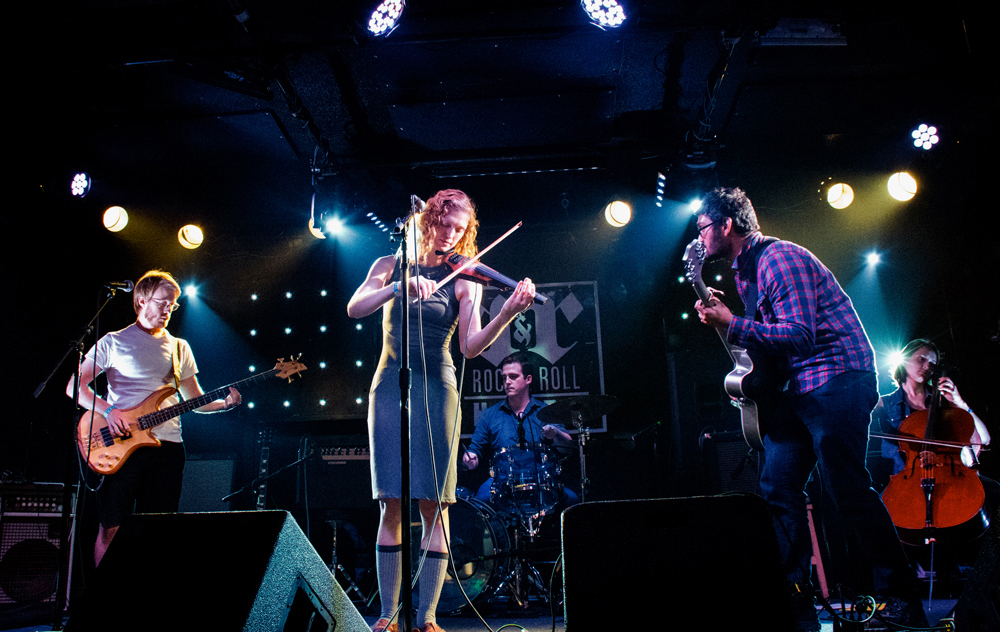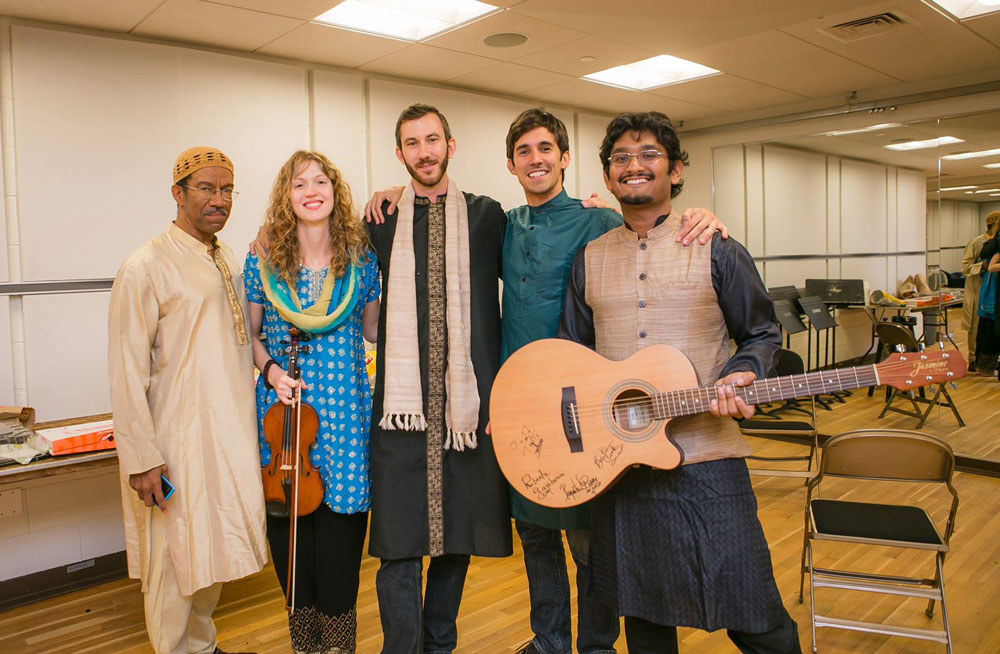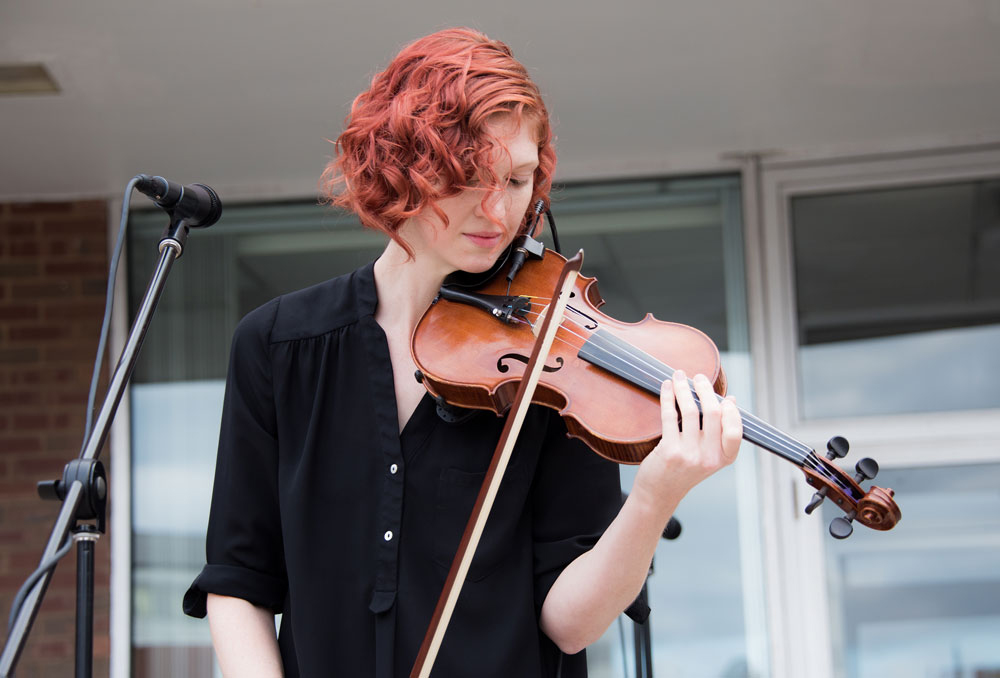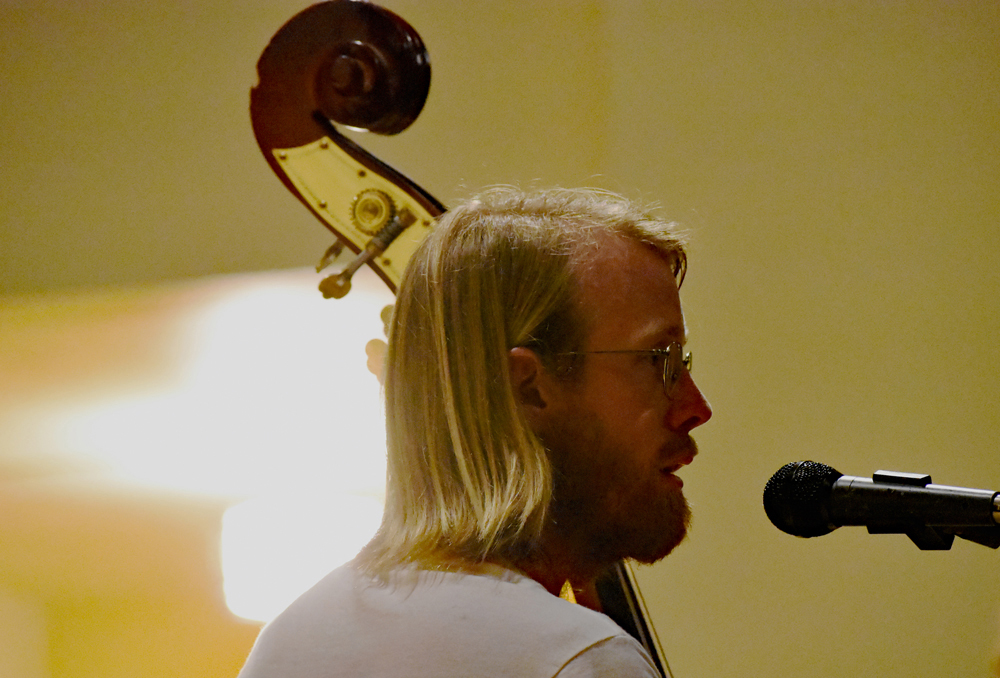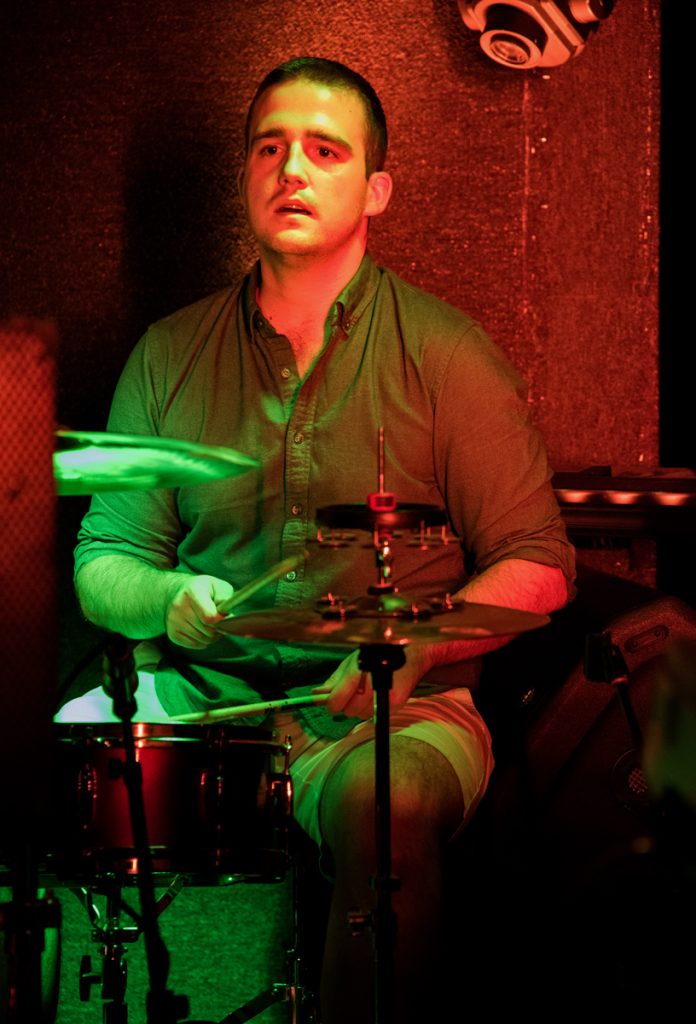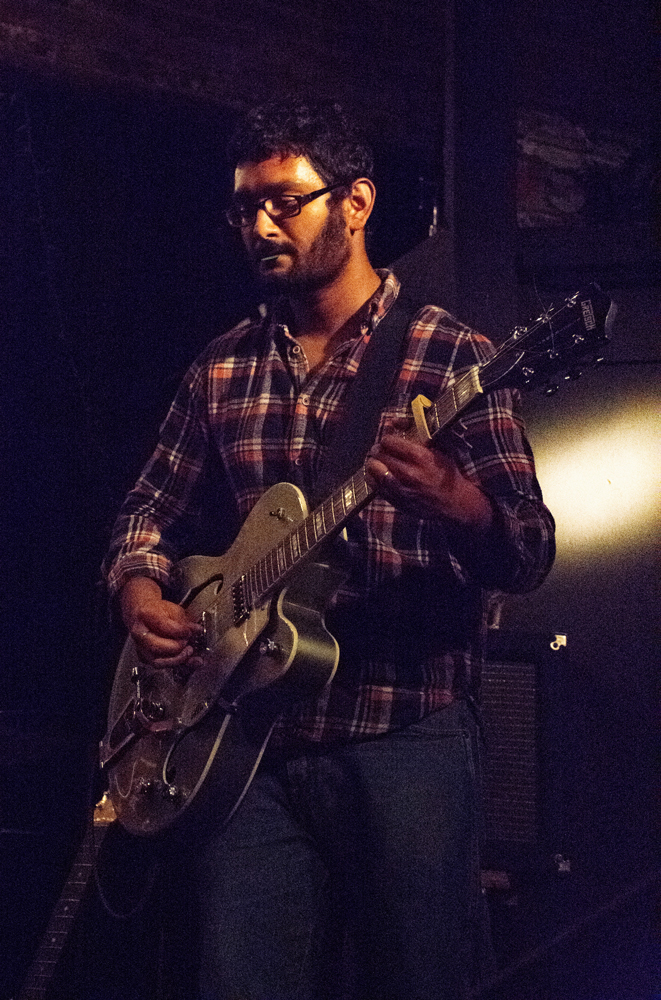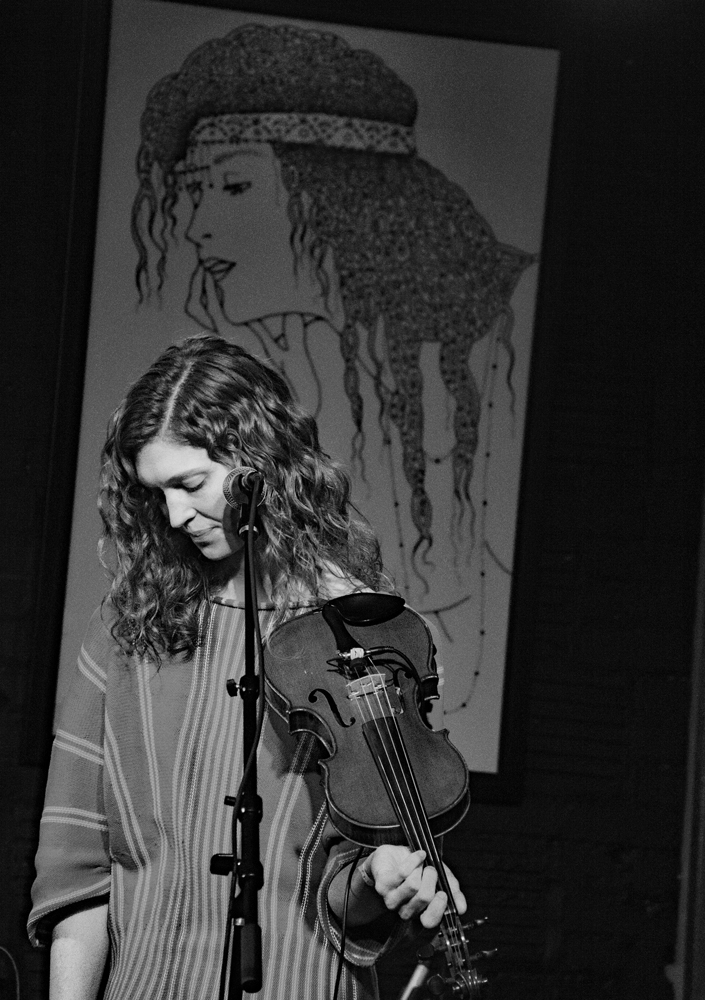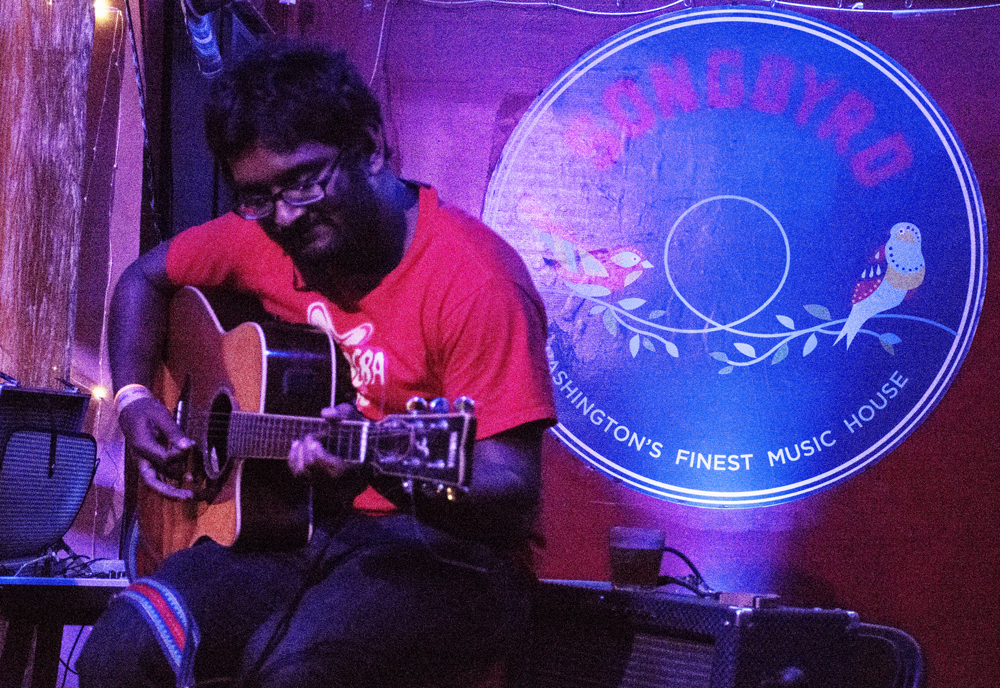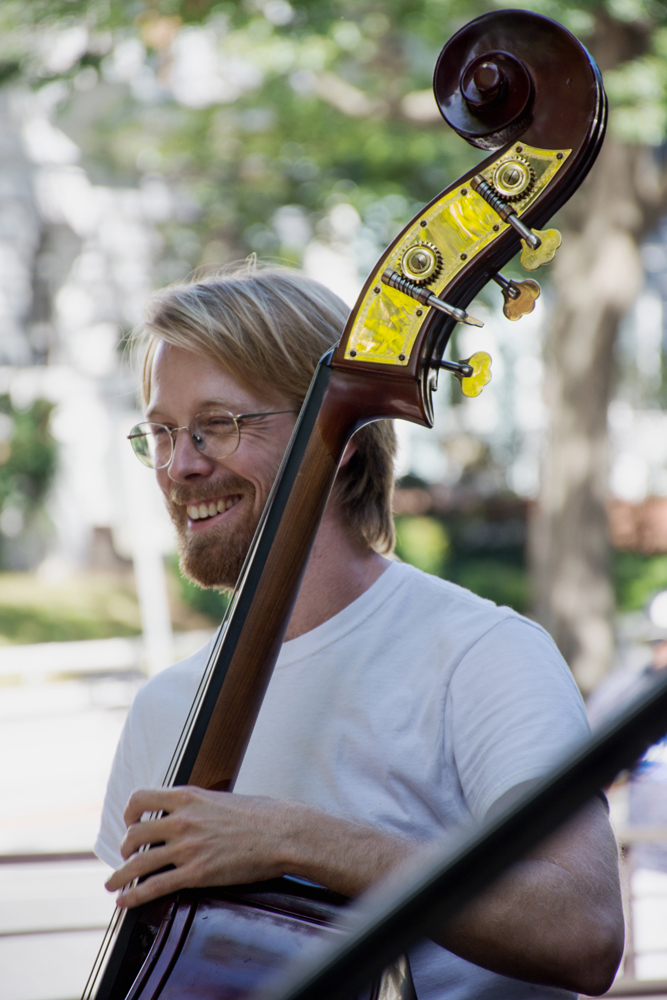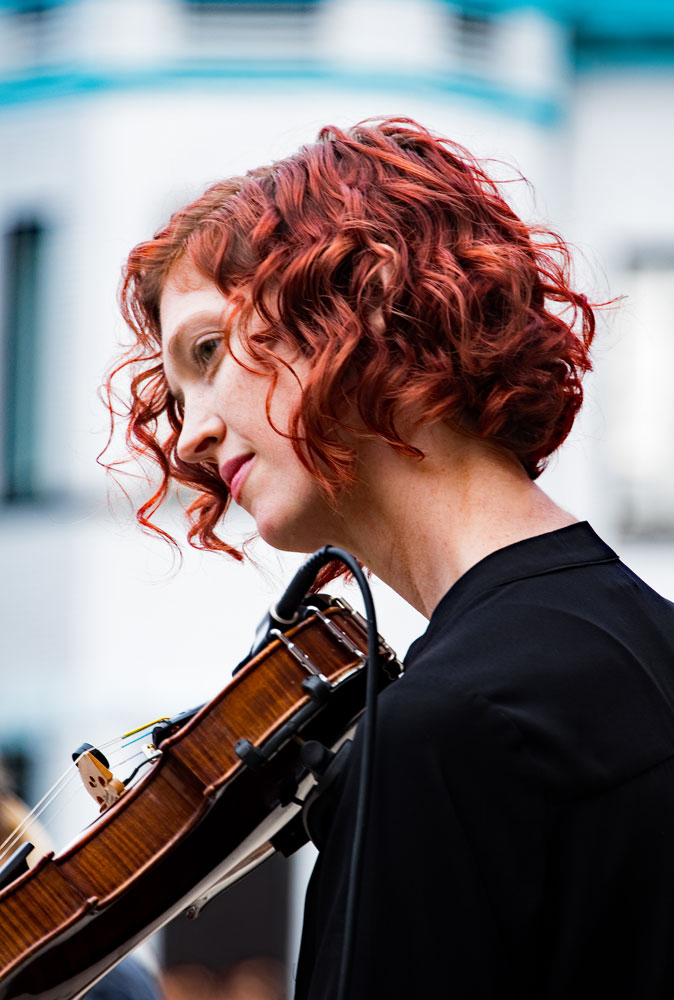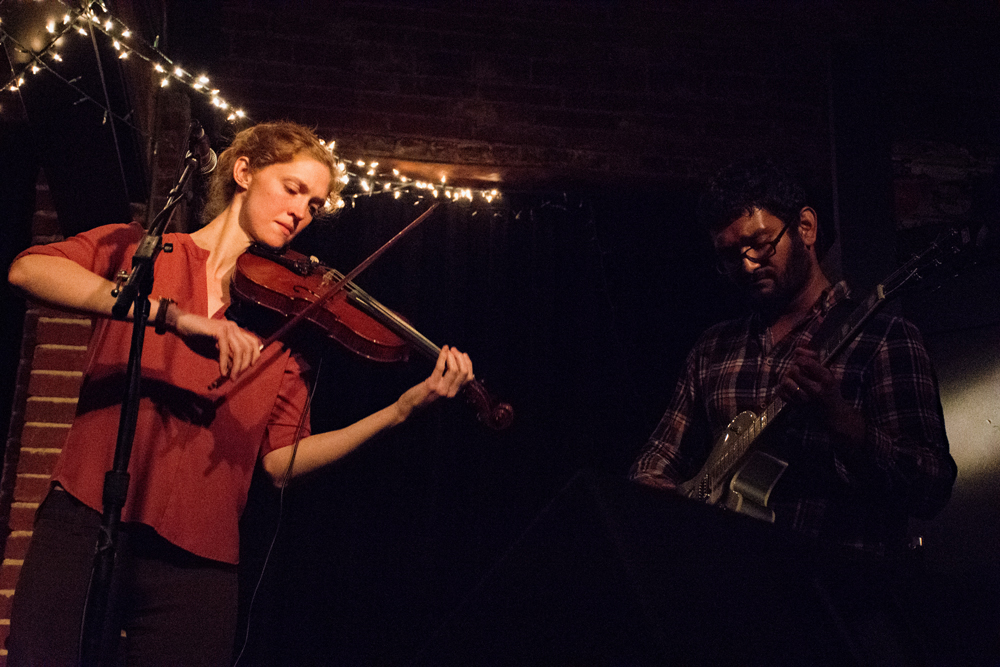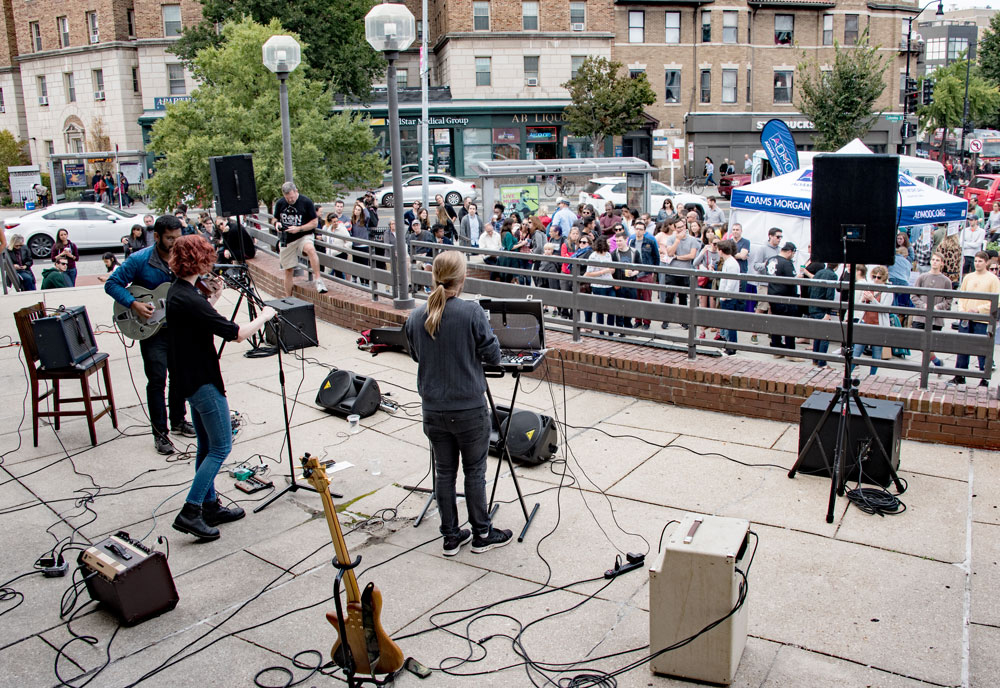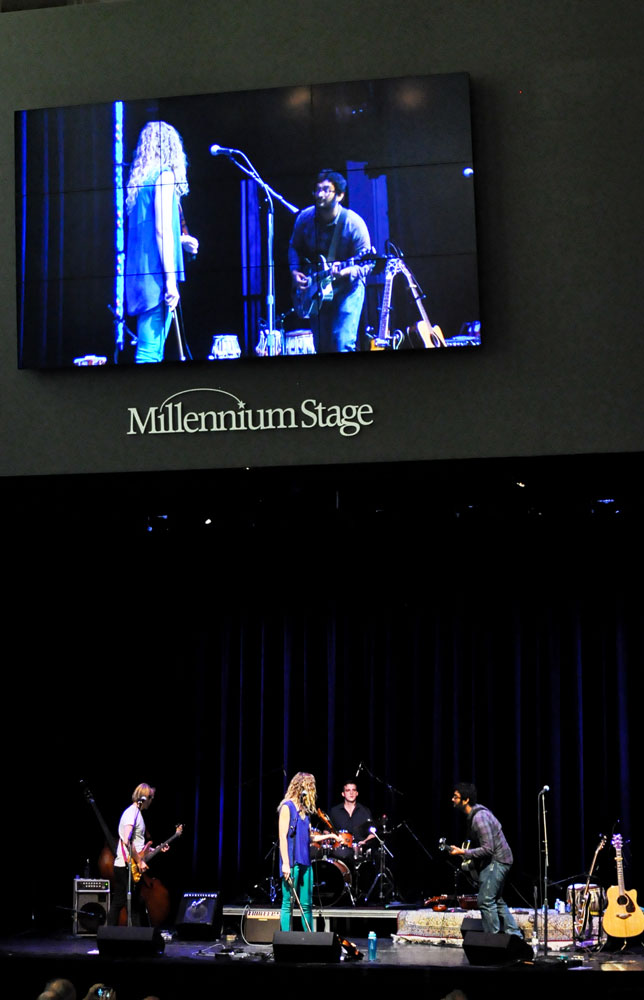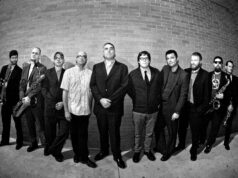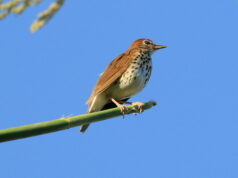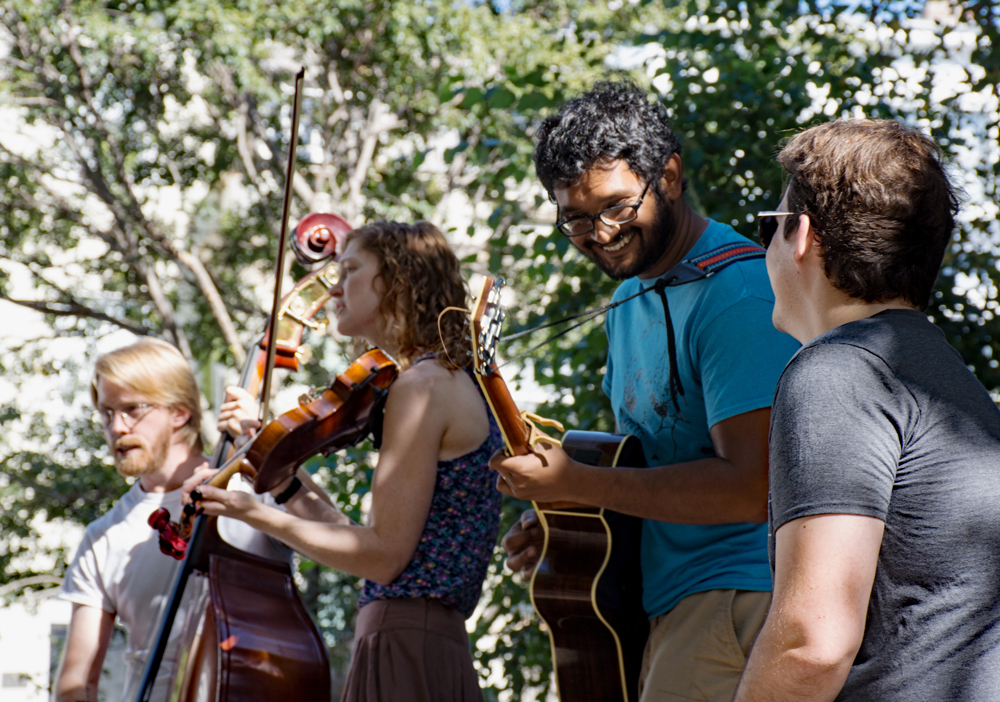
Near Northeast (NNE), one of Washington, DC’s most fascinating, unique, and talented bands will perform for the last time in a farewell show at Songbyrd Music House on Friday, July 1. NNE has been making music for the past eight years, produced four albums, and toured throughout the USA and Europe.
The band’s four members each brought a unique musical resume that resulted in songs with influences from Appalachia, blues-based rock, Bosnian folk songs, and Eno-like electronics. They are Austin Blanton: vocals, electric and stand-up bass, pocket operator, volca keys, organelle; Avy M: vocals, guitars, banjo, mandolin; Kelly Servick: vocals, violin, cello, theremin; and Antonio Skarica: percussion.
NNE describes itself as “a guitar-bass-drum-violin outfit making a mix of melodic-ambient-folky-rock sounds in Washington, DC.” As one who has followed this band since 2016, I can assure you, gentle reader, that that description doesn’t begin to scratch the service of the band’s versatility.
The band’s first album, Curios (2015), set the tone for its “folky-rock sounds” but also hinted at a willingness to experiment and push musical boundaries. True Mirror (2017) confirmed that adventurousness, the music employing more electronics, less folksiness, and added emphasis on rock influences. The companion EP, Indali Variations 1-8, showed off NNE’s improvisational and instrumental chops. 2019’s collaboration with Nashville-based Zimbabwean American songwriter Takunda M, Cabin Sessions, returned to that folky, pastoral, primarily acoustic approach (sometimes referred to as wooden music) and showcased Kelly’s gorgeous vocals.
Their latest, Gatherings (2021), combines all the above and contains some of the band’s strongest song-writing and unique performances to date. On “Shelter,” Austin showcases his yodeling skills — a throwback to the popular Country/Western musical form of the 1930s and ’40s.
Watch Near Northeast perform “Shelter” from Gatherings for its 2019 Tiny Desk entry on YouTube.
ParklifeDC’s Mark Caicedo caught up with Avy, Austin, and Kelly (unfortunately, Antonio was not available) about the band, the upcoming July 1 show, and the members’ musical futures. (And, of course, if this is really a farewell show)!
This interview has been edited for length and clarity.
Mark Caicedo: So, how many years has it been for you all? What’s your origin story?
Kelly Servick: The earliest origin story, I think was a couple of us responding to a Craigslist ad to play a show at the Kennedy Center, a benefit for the South Asian Professionals Association. I
did not expect to become part of a band but thought it was a cool thing to do at a place called the Kennedy Center that I’d never heard of. That was the first time we made music together and then we started collaborating and spending more time together.
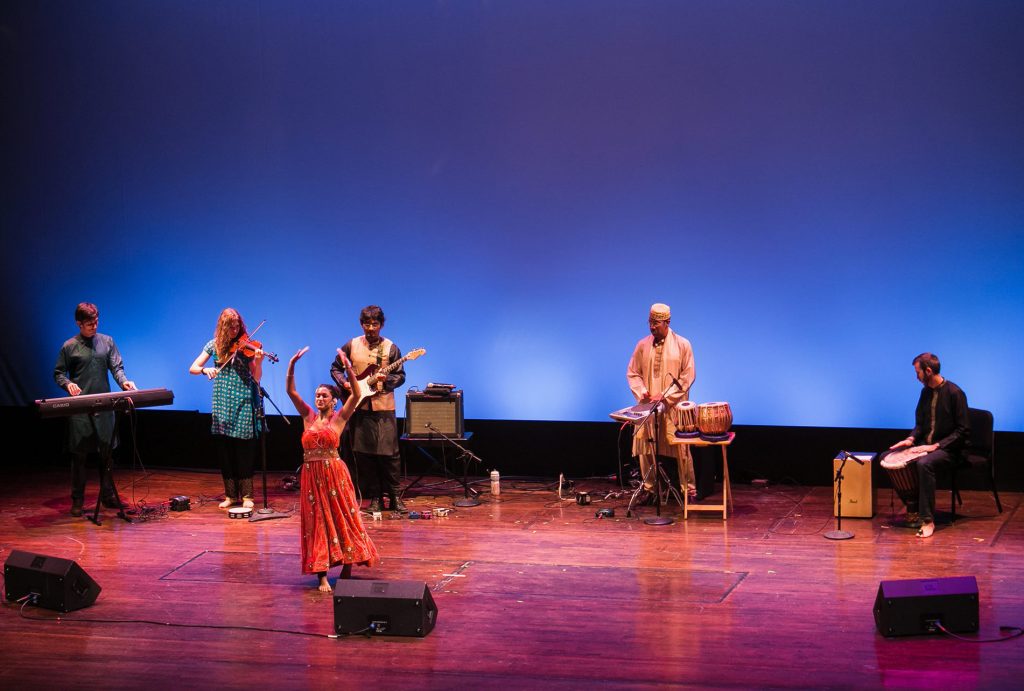
Avy M: It started off at that Kennedy center gig that our original drummer and I had, performing with Kelly for this one-off event. And it was really cool. But we stayed in touch and we met Austin in late 2013, early 2014. We played a one-off three-song setlist. So, Austin joined us and we just wrote and created music at a pretty incredible pace. I think our first show was in, early 2014 at a house off of 8th Street, and we ended up recording a lot of the first album there.
I haven’t seen that picture in a long time. It’s Alex [our original drummer], Kelly, and me and others. Remi Basu is the dancer who invited us who’s a really talented musician herself.
I was playing with other musicians just sort of informally. And then Kelly was like, “Hey, I have some vocals for something [“Ugly Things” from the first album],” and then we recorded an initial three-piece version of it.
Austin Blanton: That demo was definitely the first thing that I heard on the Craigslist ad. When I heard that I thought, “that is a really interesting piece of music… I hadn’t really heard something quite like that.” From the first moment it attracted me.
AM: Music is such an interesting art form because you’re conversing internally and with the core group. Then you show it to the outside world but you don’t know what you have and what the reaction’s going to be.
MC: You touched upon this earlier about songwriting, the first album and starting to write your own stuff. Was there a principal songwriter, or did you all just come in with ideas and start working on them collaboratively?
KS: I often say that this is the most collaborative musical project I’ve ever been a part of. For the most part, the things that we are playing individually are things that we wrote for ourselves to contribute to the song.
Things will originate with different members of the band bringing in songs or ideas in varying degrees of completion… and then really sort of trusting and allowing the others to figure out how to compliment.
MC: Compliment or pick it apart? [laughter]
KS: I think we’ve all been pretty comfortable being honest with each other saying, “like, oh, that really attracts me, that really appeals to me. But also saying this part isn’t working for me, or I don’t think I’m gonna be able to work with this, this piece of it.”
There are a lot of feelings wrapped up in bringing something that’s yours and saying, this can be ours now. I mean, I personally have always felt just really encouraged and supported.

AM: Kelly would add vocals, Austin would bring something in, and even if I brought something it would be, revised, deconstructed, and built back together. It ended up being very much a shared space where you can’t point to an individual, but rather it’s a confluence of different people and their personalities and what they’re thinking, which is the type of band I usually like listening to.
MC: The first time I saw you play was back in 2016 at the Del Ray Music Festival on a very, very hot day. I went from that first introduction to your music, listening to the first album to watching the evolution of the band. Here’s my question. Austin, you went from playing the bass to playing that little box thing. That added so much, so many layers to your music. Tell us about that.
AM: Before Austin answers, I feel like it went from an electric base to a very large upright bass. The box [actually, a synthesizer housed in a briefcase] totally changed the flavor and the feel of the music over time.
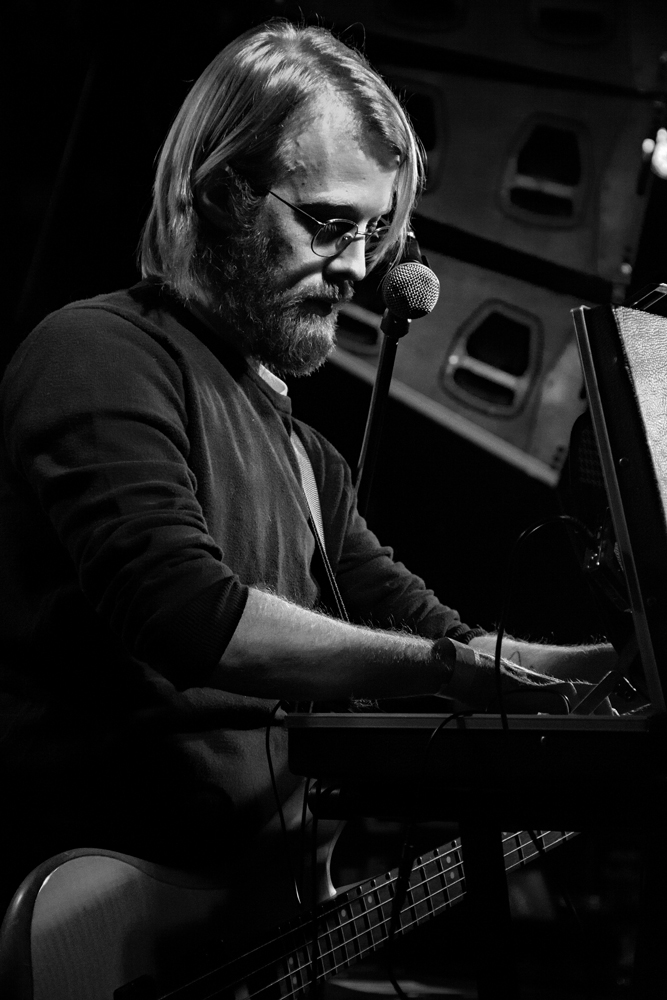
AB: For me personally, I think a lot about the quality of sounds and not just what instrument is playing, but just the sound itself. I’ve been recording albums over time and kind of refining how I think about our sound and sounds that I make.
AM: Austin produces all our music, which was another incredible experience and hopefully something that Austin didn’t pull out all of his hair. It allowed us to really think through our sound and have the DIY vibe that with the production and post-production, was a distinct element of our music. Even when you hear Curios up to the most recent one, even if it sounds more polished, it still sounds like us.
Too bad Antonio’s not here, but I feel like he was particularly good at describing challenging things that he heard in his head and wanted to come out. He and Austin would work together on drum sounds for many, many hours. Drums are tough. We’d have a lot of back and forth about a particular snare sound.
You know, as the guitar player, who’s used to turning things up to 11, it was a humbling experience where you had to think about whether your instrument served the song as opposed to, you know, yourself.
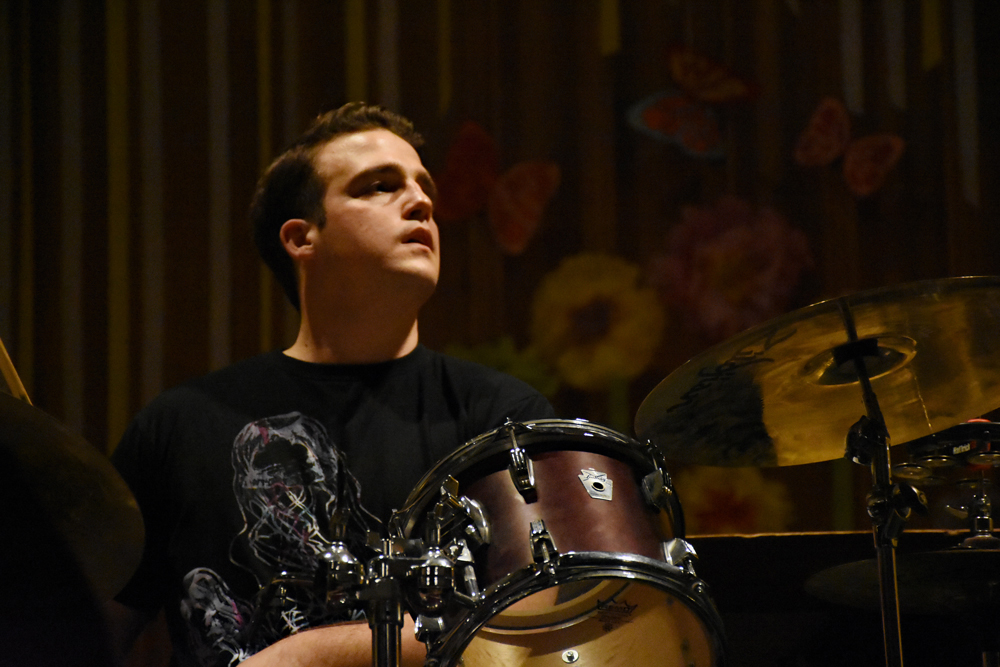
KS: Yeah, early in figuring out that electronic setup that Austin had, we felt we needed a “boom chick” behind what we’re doing. Working with Antonio I feel like we could start to have conversations about Austin creating layers and textures, which in turn made it possible for me to think about playing the cello. It allowed me to play a bass line while Austin was into the higher end. So, it was rewarding for me personally, to shift that way too because it opened up the musical space to have another type of instrument coming in.
MC: You could add a second guitar, but that would just make the guitar louder. Not necessarily better.
AM: That’s funny, because we put out this third album in 2019 that we love, and it was in collaboration with our friend Takumba. And sort of like what Kelly was saying with her cello journey was that it became clear to serve the song and to provide that other texture. Me personally, I would play a guitar, but I played an open tuning with the capo or other times I’d play mandolin, which I don’t really know how to play. So, I would end up tuning it in bizarre tunings or banjo, which, you know, really had that twang and sharpness, and the lack of sustain which I really liked.
Everyone had their own COVID journey. I took part in a one-minute song a day project during the first 50 days of lockdown. Part of that journey involved playing a terribly out of tune thumb piano, but it came with a tuning hammer. If you hold it at the head and drop it where you would be holding it onto the strings, gravity will let it bounce and [produce a sound] that reminded me of a hammer D.
So, I ended up using that sound for those 1-minute songs as well as for “Window” (from Gatherings). In addition to playing with a hammer, I sang into the resonating chamber of the hollow body [guitar], which isn’t something that I invented, but made for a nice counterpoint to Kelly’s very beautiful song. That spirit of experimentation and exploration is really important in music in general.
Watch Near Northeast perform “Window” for its Tiny Desk submission in 2021 on YouTube.
MC: Let me switch gears a little here. I want to bring up kind of a sad subject, the final show. What do you envision for it? How would you like to celebrate what you’ve accomplished and what you’ve recorded and put out in the world?
KS: In terms of this final show, we’re starting to process the emotions. I’ll just start by briefly saying I did not move to DC for musical reasons, nor did I expect DC to be a particularly meaningful creative home.
You know, I didn’t really know anything about DC coming here, but the reputation that was in my head was not that this was a musical city or that there was a lot of space to be weird and be musical. And I was wrong about that, and I feel like we found people who were willing to come with us on this eight-year experiment. I hope that our final show will really sort of be celebrating that and expressing gratitude for the people who cared and listened.
MC: You know, life is funny, people do get back together and create music again. You never know what’s gonna happen.
AB: So, not ruling it out, not ruling it out. We’re not saying this is the absolute end, you know, we’re obviously still gonna talk. I’ve met so many people through this band. I honestly feel like most of my friends, I could probably trace it to this band. I will also say, echoing everyone else here this is a moment of some sadness, but also of celebration.
AM: The songs that we play for our final show will hopefully show the many layers of our band. Some of us are moving out of town, perhaps forever or perhaps for a more finite period of time. But especially due to COVID my thinking has changed, that bands really only function when you’re in the same room together. And that definitely turned out to not be the case. If you look at our last album, for instance, a lot of it was finalized with us separated because of the pandemic.
I personally would love to do an instrumental soundtrack for a documentary or a short. But this will be a long rest, and hopefully a profound rest that we can all enjoy starting with the goodbye show.
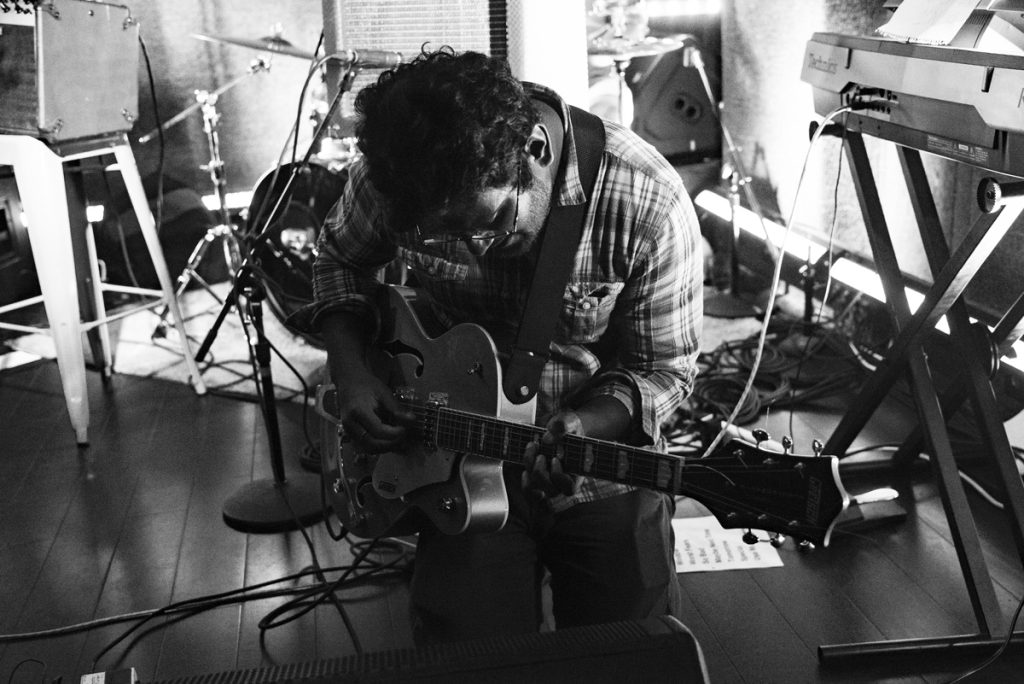
MC: Just on a personal note, you were one of the earliest bands I photographed when I started shooting live music. Combining live music with my other love, photography, was very special and important to me.
And as I got into it more and more, I found out how rich the DC music scene really is. It’s just phenomenal, not just for the music itself, but how the musicians support each other, know each other, work with each other, and push each other to be better.
KS: Yeah. You wouldn’t think it in a place like DC, but it exists without a doubt. This is a very special music scene where people uplift each other, show up for each other’s gigs. It’s been a tremendous experience and you just have a lot of very passionate, intelligent and diverse people. This city, it attracts that kind of person. So, I just feel so lucky to have been part of the music scene.
MC: A couple folks from Oh He Dead are going to play at the farewell show and seeing the phenomenal success that they’re having and knowing that CJ and Andy are getting recognized and being successful at what they’re doing… it’s really wonderful to watch that happen.
AM: I’ve known CJ for many years. We’ve known them and liked their music ever since they started. Yeah. And it’s just fantastic to see all the success that they’ve had.
Other bands that came out of the music scene, North Country, where Austin plays. Austin mentioned Cat You Dog You. When I think of the early days of this band, I think of bands like Paperhouse and others that did really cool things. At the goodbye show, I want to give a shout out to all these local bands that either we played with, or we saw them play, or were inspired by.
[Thinking about] our place in the DC music scene… I am not someone who can say what our place is, but I do like thinking that we’re just one part of this very intricate, beautiful tapestry that we’ve woven into the DC musical space these last few years.
Stream Gatherings by Near Northeast on Spotify:
MC: I guess my final question I want to ask is about future plans. In terms of music, I’m assuming you’re going to continue doing that. Any concrete plans?
AM: We’ll see. That’s a good question. I mentioned the, the fifty 1-minute daily tracks. I would love to put that out in an interesting form maybe as part of some sort of ‘art in the days of the pandemic’ or ‘art in the midst of a lockdown.’
We also wrote a bunch of tracks that we did post “Gatherings” that we performed as part of our Mid-Atlantic tour. We finalized a suite of three songs and tried a few others that I really think are a beautiful epilogue that someday we’d love to share with the world.
AB: We’re very supportive of each other. Kelly played a solo show at Rhizome a couple months ago. I also played a solo show and we’re all trying new things.
We just saw the Bob Dylan musical (Girl From the North Country) in New York City after we played our show in Brooklyn. And what I liked about that play, in a jukebox musical way, a lot was resolved, but a lot was unresolved and, you know, life just continues and you don’t tie a ribbon around a box and turn it in. It just continues. There will always be threads ready to be picked up on. I would be very sad if we didn’t do something, even if it’s 10 years later.
MC: Well, thank you so much for your time, I really appreciate it. I know it’s been a long day for you coming back from New York and so I don’t want to keep you up.
KS: I was just going to say that photographing us and caring about our music has just been so encouraging and it really made us feel part of the scene.
AM: I just want to echo what Kelly said. It’s been such a pleasure to get to know you as well as other people that are there to document and support local music, including our band. We feel very grateful.
***
Near Northeast performs at Songbyrd Music House on Friday, July 1.
Near Northeast
w/ Rosie Cima, Oh He Dead
Songbyrd Music House
Friday, July 1
Doors @ 7pm
$15 ($18 day of show)
All ages
Here are some pictures of Near Northeast performing over the last few years. Except where noted, all photos copyright and courtesy of Mark Caicedo.
